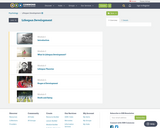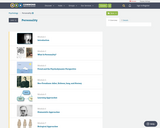
Introduction to Computers - brief videos
- Subject:
- Applied Science
- Computer Science
- Education
- Educational Technology
- Material Type:
- Primary Source
- Date Added:
- 09/25/2018

Introduction to Computers - brief videos
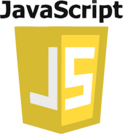
Javascript Introduction

該当のできることステートメントRelevant Can-Do Statementsラボ時間に関することは全部わかっています。この学期を楽しみにしています!I am in full understanding of the requirements of lab time and am excited for the semester!素朴な自己紹介ができます。I can introduce myself.

Description:Students will do simple self-introductions using their name, nationality, and year in school.They will practice introducing themselves and others. Proficiency Level: Novice LowNCSSFL-ACTFL Can-Do StatementsI can introduce myself with:My nameMy nationalityMy year in schoolI can identify:Where other people are fromWhat other people’s majors areWhat year in school somebody is inStudents Can Identify and read Hiragana
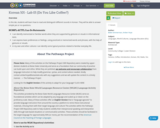
In this lab, students will learn how to read and distinguish different sounds in Korean. They will be able to answer simple yes or no questions.NCSSFL-ACTFL Can-Do Statements:I can identify memorized or familiar words when they are supported by gestures or visuals in informational texts.I can express basic preferences or feelings, using practiced or memorized words and phrases, with the help of gestures or visuals.In my own and other cultures I can identify some typical practices related to familiar everyday life.

Students will work in pairs/small groups to get to know everyone. They will guess certain aspects of their lives (major, name, hometown, pets) and then present their answers in the target language.

Ensembles d'exercices autocorrigés INGInious pour apprendre la programmation en Java.
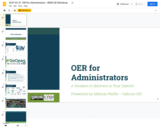
Slide deck for use with K12 School Administrators at Calhoun ISD. Includes sections on: OER in Michigan, OER Basics, Common OER Myths, and activities tied to the OER for Administrators Playbook.
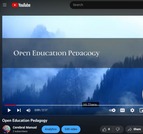
A short introduction video about open education pedagogy for simple education purposes. The goal is to help educational organizations increase inclusivity, belonging, equity and diversity. This is done by designing curriculum with the student, instead of for the student.

A short introduction video about open educational resources for simple education purposes. The goal is to have free material for students to access to increase inclusivity, belonging, equity and diversity.

Introductory P5 workshop for Processing programmers. Made for CreaTe, usable for others.

This resource is a course map that aligns with Psychology 2e and includes module level outcomes and suggested activities/resources/assignments. The course map was authored by four faculty from three different community colleges in Arizona including, Central Arizona College, Eastern Arizona College, and Yavapai College.
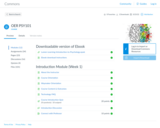
Introduction to psychology through such topics as the scientific method in psychology, survey of different fields in psychology, heredity and environment, intelligence, emotions, motivation, nervous system, and learning processes.

Topic 1 - Introduction to Psychology: Definition, Theoretical Perspectives, & SubfieldsThis course utilizes the OpenStax Psychology textbook provided by Rice University. The book is available for free in many formats. Use the links below to access the textbook in a format best suited to your needs.Textbook readings: pp. 5–7; pp.10-25.Watch: Past, Present, and Promise is the first program in the DISCOVERING PSYCHOLOGY series. It provides an introduction to and overview of psychology, from its origins in the nineteenth century to current study of the brain's biochemistry. You'll explore the development of psychology in general and some of the paths scientists take to determine relationships among the mind, the brain, and behavior.©2001 WGBH Educational Foundation All Rights ReservedLearning objectives:1. Define psychology.2. Describe how psychoanalytic, behavioral, humanistic, cognitive, and multicultural perspectives view human behavior and mental process.3. Define these current “subfields” in psychology: biopsychology, evolutionary, developmental, industrial-organizational, health, clinical, and forensic.

Psychology is designed to meet scope and sequence requirements for the single-semester introduction to psychology course. The book offers a comprehensive treatment of core concepts, grounded in both classic studies and current and emerging research. The text also includes coverage of the DSM-5 in examinations of psychological disorders. Psychology incorporates discussions that reflect the diversity within the discipline, as well as the diversity of cultures and communities across the globe.Senior Contributing AuthorsRose M. Spielman, Formerly of Quinnipiac UniversityContributing AuthorsKathryn Dumper, Bainbridge State CollegeWilliam Jenkins, Mercer UniversityArlene Lacombe, Saint Joseph's UniversityMarilyn Lovett, Livingstone CollegeMarion Perlmutter, University of Michigan
